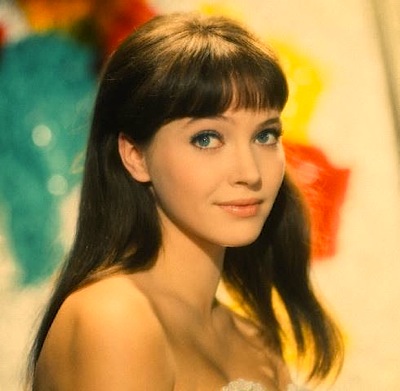By David Ross. In preparation for my film course (see here), I watched Godard’s A Woman is a Woman (1961) for the first time in years. [See the first 10 minutes of the film above.] I remembered the film as a wearisome deconstructive exercise brought to life only by Anna Karina in the lead role. The film was as tedious as ever, and La Karina as irresistibly kittenish. She poses, pouts, and purrs, in what may be the single greatest act of seduction – seduction of the camera, seduction of the audience – ever filmed. Of course, Karina manages to seduce none of the characters onscreen despite dogged effort. This is Godard’s little joke, or maybe part of his point.

What a cold and aloof ass Godard must have been to persist in his ironic games instead of allowing himself to be seduced, as Degas allowed himself to be seduced over and over again. Godard’s camera is busy making political and aesthetic points when it should be, as it were, making love. Karina and Godard married during the shooting of A Woman is a Woman. I suppose a man can be excused a certain sobriety with respect to the woman he sleeps with every night, but he cannot be excused an imperturbable irony. Godard’s clinical distance is an embarrassment to the male imagination and a travesty of what’s owed to a woman on her honeymoon. What a shame that at the height of her beauty and charm Karina wound up in a string of pretentious, sporadically brilliant Godard films and not in a string of delightful romantic comedies directed by someone like George Cukor or Billy Wilder. She might have been another Audrey Hepburn.
Oddly enough, A Woman is a Woman put me in mind of Mark Steyn. Karina’s character Angela desperately wants a baby, but she can find nobody willing to impregnate her. I couldn’t help construing or misconstruing this as an allegory of Europe’s plunging birthrates and demographic death spiral, of which Steyn is the poet laureate. Here’s a typical exchange between Angela and Émile Récamier as Brialy:
Angela: I want a baby
Brialy: You’re being unreasonable.
Angela: I want a baby
Brialy: Stop this madness
Angela: You’re being mean.
Brialy: I don’t like that tartan skirt on you.
Angela: Good. I’m not trying to please anybody. I want a baby.
Brialy: Stop this madness.
Angela: I’m going to the Zodiac [a strip club]
Brialy: Go and strip then. You disgust me.
Angela: Jerk. We can’t live off your lousy income. You’re such a coward.
Brialy: I’d rather be a coward than fool
Angela [sadly]: Why am I a fool for wanting a baby?
Brialy: Shut up or I’ll leave.
Angela: Where would you go?
Brialy: I don’t know. Mexico.
Angela: You’re crazy,
Brialy: No, you’re crazy.
Angela: I want a baby.
The camera then cuts to a Paris boulevard, where a man-in-the-street reporter type accosts a young man:
Reporter: Excuse me, could you sleep with this young lady so she can have a baby?
Pedestrian: It’s not a good time. I’m a bit busy today.
Procreation, as Steyn argues constantly, is an affirmation of continuity with both the past and the future (see here for a typical riff). It is a matter of believing in a narrative of history and choosing to participate. Modern Europe – where the non-immigrant birthrate is far below replacement level – seems to construe the future as somebody else’s problem, as something for state bureaucrats to work out while one holidays in Ibiza. Does Godard’s comedy pick up on something then latent – now patent – in the European zeitgeist? Perhaps not – perhaps so.
Posted on October 3rd, 2010 at 12:28pm.
David – it seems to be a requirement in French films for beautiful women to be treated dismissively. It reinforces the French male ego. Look at how Godard treated Brigitte Bardot in “Contempt.” Truffaut also did this throughout his career, making films about beautiful women who are in love with men who reject them (with the women always going crazy as a result, as in “The Story of Adele H.”), or who are beautiful and faithless and destroy those around them (“Jules et Jim”). You will never see a French film in which the women rejects the man and goes on to a happy, normal life. As for the falling European birth rates, I’m sure there is a connection.
I’ve noticed much the same thing. This French tendency extends to a lot of other directors. A few months ago I was watching “Tous les Matins du Monde” on TCM, an otherwise excellent film starring Gerard Depardieu and set in the 17th century about a master of the viola da gamba and his young protege – and it had much the same attitude to women. The daughter of the master musician falls in love with his student, sleeps with him, and then when he leaves her (he tells her he’s bored with her), she wastes away to a shell. French movies are full of beautiful women loving unattractive, heartless men, with the women generally falling to pieces/going crazy/committing suicide when the men leave them. Really, it’s a pretty unrealistic plot device.
With regard to the declining birth rates: the same thing happened in early imperial Rome, when Augustus had to literally order the Roman upper classes to get married and have children because the birth rates were falling so low.
What’s a “green” coffee?